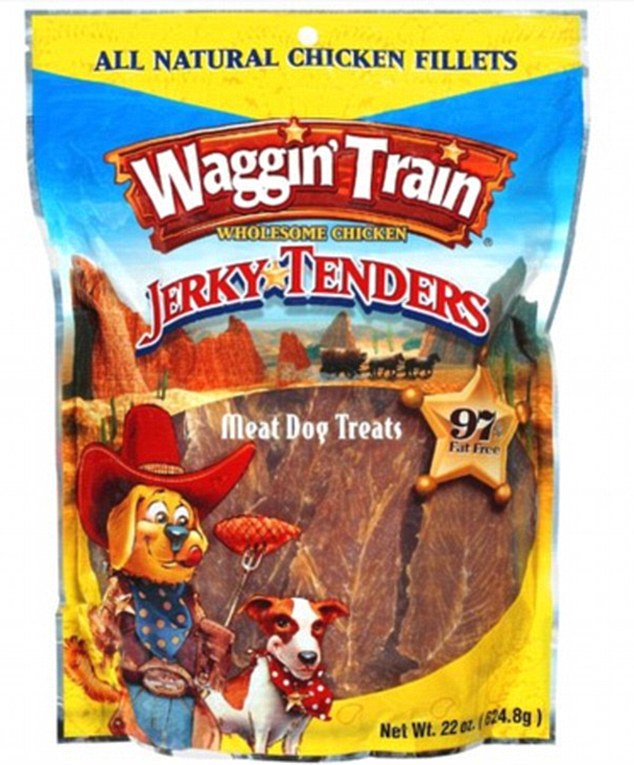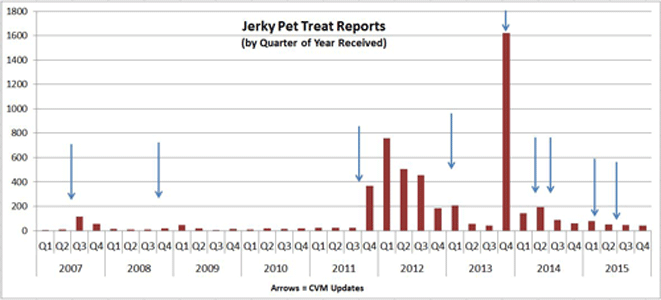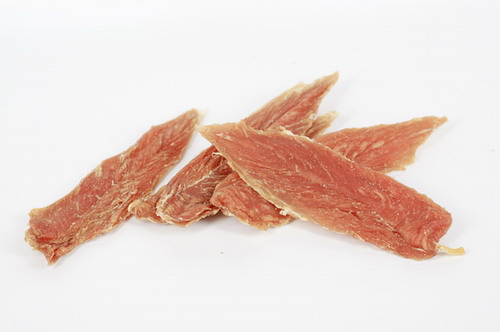Today, the U.S. Food and Drug Administration updated its ongoing investigation into pet illnesses and deaths in animals that ate jerky pet treats. This update includes the latest information about complaints of illnesses, test findings, and measures taken by the agency to identify the cause of the illnesses and deaths.

Reported cases have been on the decline in recent years. Since the FDA’s last update in September 2014 and through the end of 2015, there have been 200 reports received. During the previous period (from May 2014 to September 2014) 270 cases were reported to the FDA.
Since the investigation began in 2007 and went through December 31, 2015, the FDA has received approximately 5,200 complaints of illness associated with consumption of chicken, duck, or sweet potato jerky treats, most of which involve products imported from China.
“Pet owners should be aware, however, that manufacturers do not need to list the country of origin for each ingredient used in their products,” cautions Martine Hartogensis in an FDA published report (video below).

The reports involve more than 6,200 dogs, 26 cats, three people, and include more than 1,140 canine deaths. The FDA continues to investigate the cause of these illnesses in conjunction with our partners in the Veterinary Laboratory Investigation and Response Network (Vet-LIRN), a network of animal health laboratories affiliated with the FDA.
During the investigation, the FDA detected antimicrobial and antiviral residues in an imported duck jerky product and added duck jerky products to the testing methodology in 2015. As a result of this testing, the FDA revised its existing Import Alert on May 11, 2016 (originally dated October 2015) to include all poultry jerky-type treats, not just chicken.
The import alert contains a Red List of firms and products subject to Detention without Physical Examination (DWPE):
- Pet Center China Co., Ltd.
- Qingdao Jingwang Pet Foods, Co., Ltd.
- Qingdao Myjian Foodstuff Co., Ltd.
- Tiagnjin Shengfa Foodstuffs Co., Ltd.
- Weifang Sinogen Group Co., Ltd.
- Yantai Yummy Pet Food Co., Ltd.
For complete details, go to the Import Alert.
The majority of complaints involve chicken jerky (treats, tenders, and strips), but others include duck, sweet potato, and treats where chicken or duck jerky is wrapped around dried fruits, sweet potatoes, yams, or rawhide.
The agency continues to caution pet owners that jerky pet treats are not required for a balanced diet, and encourages them to consult with their veterinarians if they notice symptoms in their pets, such as decreased appetite, decreased activity, vomiting, diarrhea (sometimes with blood or mucus), increased water consumption and/or increased urination.
The following FDA video gives more details:
Updated testing plan for future jerky includes one or more of the following:
- Epichlorohydrin and 3-Monochloropropane-1,2-diol (3-MCPD)
- Glycerin metabolites (such as glyceraldehyde, glycolic acid, diglycolic acid, tartronic acid, and glyoxylic acid)
- Sulfites and Bisulfites (food additives/preservatives)
- Antibiotics (including azitromycin, streptozotocin, and florfenicol)
- Antivirals (including ritanovir)
- Other chemicals and poisonous compounds (such as chaconine, bufotenin, citrinin, 4-Ipomeanol, sulfonamide herbicides, and others)
More information on the actual testing of the jerky can be found here.

If you believe your pet has become ill from consuming a jerky pet treat, please report it electronically through the FDA’s Safety Reporting Portal or by phone to your local FDA Consumer Complaint Coordinator. While the FDA does not necessarily respond to every individual complaint submitted, each report is valuable and becomes part of the body of knowledge that helps to inform the investigation.
As the FDA points out, since these treats are not necessary for your pet’s diet, it’s safest to just avoid treats made with these types of jerkies altogether. Instead, opt for safer treats or fresh foods such as carrots or apples in small quantities. If you are unsure of where a product is sourced from, skip it. It’s way better to deny your dog a treat than to add to the tragedies that have already occurred.

